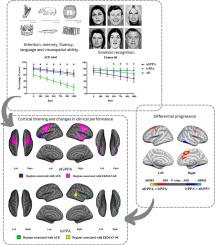当前位置:
X-MOL 学术
›
Brain Res.
›
论文详情
Our official English website, www.x-mol.net, welcomes your feedback! (Note: you will need to create a separate account there.)
Clinical and cortical trajectories in non-fluent primary progressive aphasia and Alzheimer’s disease: A role for emotion processing
Brain Research ( IF 2.9 ) Pub Date : 2024-01-28 , DOI: 10.1016/j.brainres.2024.148777 Ramon Landin-Romero , Fiona Kumfor , Austin YS Lee , Cristian Leyton , Olivier Piguet
Brain Research ( IF 2.9 ) Pub Date : 2024-01-28 , DOI: 10.1016/j.brainres.2024.148777 Ramon Landin-Romero , Fiona Kumfor , Austin YS Lee , Cristian Leyton , Olivier Piguet

|
To examine the clinical trajectories and neural correlates of cognitive and emotion processing changes in the non-fluent/agrammatic (nfvPPA) and the logopenic (lvPPA) variants of primary progressive aphasia (PPA). Observational case-control longitudinal cohort study. Research clinic of frontotemporal dementia. This study recruited 29 non-semantic PPA patients (15 nfvPPA and 14 lvPPA) and compared them with 15 Alzheimer’s disease (AD) patients and 14 healthy controls. Participants completed an annual assessment (median = 2 years; range = 1–5 years) of general cognition, emotion processing and structural MRI. Linear mixed effects models investigated clinical and imaging trajectories between groups. Over time, lvPPA showed the greatest cognitive deterioration. In contrast, nfvPPA showed significant decline in emotion recognition, whereas AD showed preserved emotion recognition, even with disease progression. Importantly, lvPPA also developed emotion processing impairments, with disease progression. Both nfvPPA and lvPPA showed continuing cortical atrophy in hallmark language-processing regions associated with these syndromes, together with progressive involvement of the right hemisphere regions, mirroring left hemisphere atrophy patterns at presentation. Decline in emotion processing was associated with bilateral frontal atrophy in nfvPPA and right temporal atrophy in lvPPA. Our results show divergent clinical courses in nfvPPA and lvPPA, with rapid cognitive and neural deterioration in lvPPA and emotion processing decline in both groups and support the concurrent assessment of cognition and emotion processing in the clinic to inform diagnosis and monitoring in the non-semantic variants of PPA.
中文翻译:

非流利原发性进行性失语症和阿尔茨海默病的临床和皮质轨迹:情绪处理的作用
旨在检查原发性进行性失语症 (PPA) 不流利/语法错误 (nfvPPA) 和语言减少 (lvPPA) 变体的认知和情绪处理变化的临床轨迹和神经相关性。观察性病例对照纵向队列研究。额颞叶痴呆研究临床。这项研究招募了 29 名非语义 PPA 患者(15 名 nfvPPA 和 14 名 lvPPA),并将他们与 15 名阿尔茨海默病 (AD) 患者和 14 名健康对照进行比较。参与者完成了一般认知、情绪处理和结构 MRI 的年度评估(中位数 = 2 年;范围 = 1-5 年)。线性混合效应模型研究了组间的临床和成像轨迹。随着时间的推移,lvPPA 显示出最严重的认知恶化。相比之下,nfvPPA 的情绪识别能力显着下降,而 AD 的情绪识别能力保持不变,即使疾病进展也是如此。重要的是,随着疾病进展,lvPPA 还会出现情绪处理障碍。 nfvPPA 和 lvPPA 均显示出与这些综合征相关的标志性语言处理区域的持续皮质萎缩,以及右半球区域的逐渐受累,反映了就诊时的左半球萎缩模式。情绪处理能力下降与 nfvPPA 中的双侧额叶萎缩和 lvPPA 中的右颞叶萎缩有关。我们的结果显示 nfvPPA 和 lvPPA 的临床过程不同,两组的 lvPPA 认知和神经快速恶化,情绪处理能力下降,支持在临床中同时评估认知和情绪处理,为非语义变异的诊断和监测提供信息购电协议。
更新日期:2024-01-28
中文翻译:

非流利原发性进行性失语症和阿尔茨海默病的临床和皮质轨迹:情绪处理的作用
旨在检查原发性进行性失语症 (PPA) 不流利/语法错误 (nfvPPA) 和语言减少 (lvPPA) 变体的认知和情绪处理变化的临床轨迹和神经相关性。观察性病例对照纵向队列研究。额颞叶痴呆研究临床。这项研究招募了 29 名非语义 PPA 患者(15 名 nfvPPA 和 14 名 lvPPA),并将他们与 15 名阿尔茨海默病 (AD) 患者和 14 名健康对照进行比较。参与者完成了一般认知、情绪处理和结构 MRI 的年度评估(中位数 = 2 年;范围 = 1-5 年)。线性混合效应模型研究了组间的临床和成像轨迹。随着时间的推移,lvPPA 显示出最严重的认知恶化。相比之下,nfvPPA 的情绪识别能力显着下降,而 AD 的情绪识别能力保持不变,即使疾病进展也是如此。重要的是,随着疾病进展,lvPPA 还会出现情绪处理障碍。 nfvPPA 和 lvPPA 均显示出与这些综合征相关的标志性语言处理区域的持续皮质萎缩,以及右半球区域的逐渐受累,反映了就诊时的左半球萎缩模式。情绪处理能力下降与 nfvPPA 中的双侧额叶萎缩和 lvPPA 中的右颞叶萎缩有关。我们的结果显示 nfvPPA 和 lvPPA 的临床过程不同,两组的 lvPPA 认知和神经快速恶化,情绪处理能力下降,支持在临床中同时评估认知和情绪处理,为非语义变异的诊断和监测提供信息购电协议。



























 京公网安备 11010802027423号
京公网安备 11010802027423号